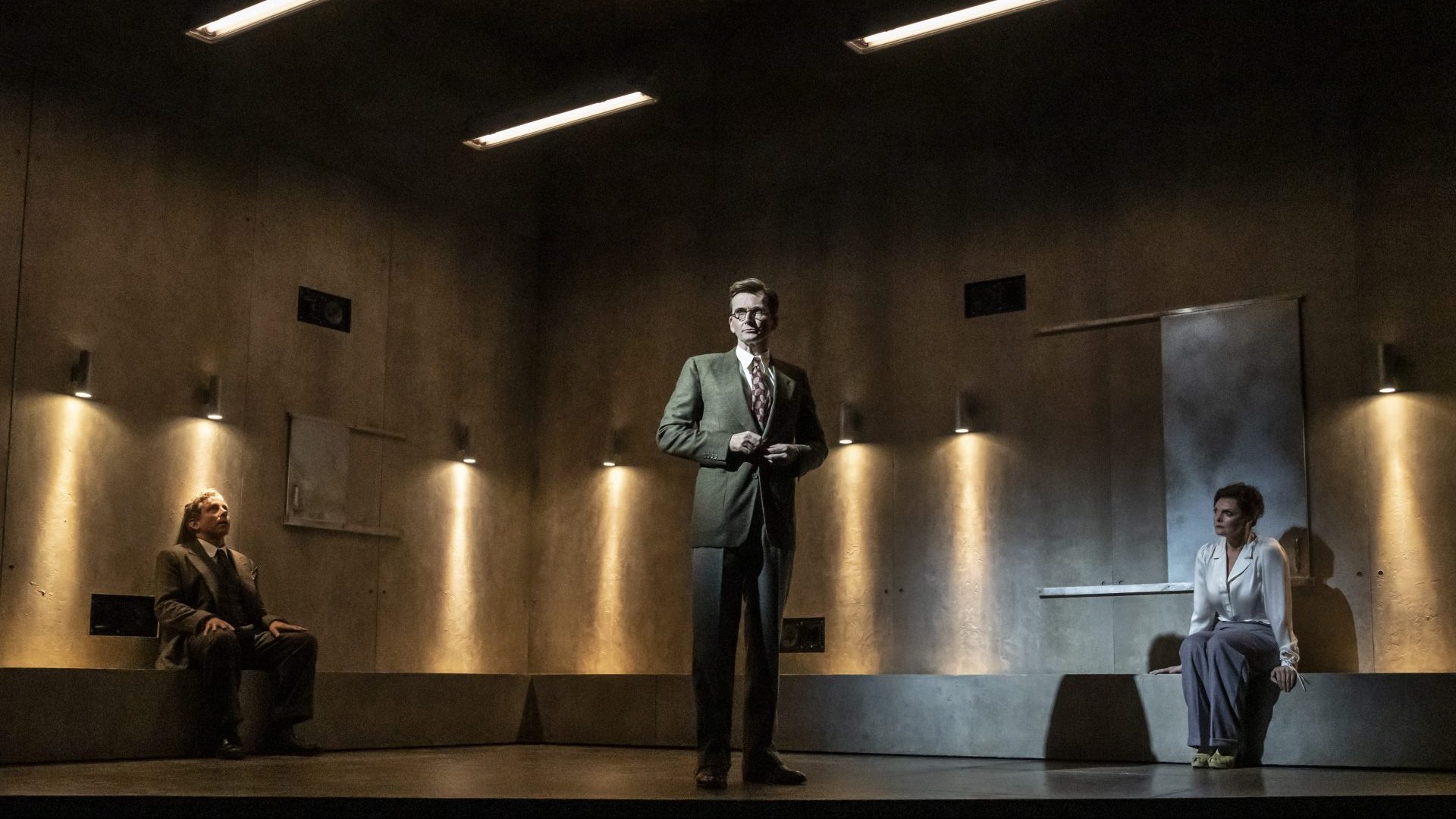Not that it happens often, but I’m writing this round-up of the BFI London Film Festival having just got back from the betting shop.
After seeing the film debut on the last Friday night of the fest, I went out the next morning to whack down a hundred quid on She Said to win Best Picture at the 2023 Oscars. I’m pretty good at Oscar predictions – I won a grand on The Artist a few years ago – and this just feels like a winner to me, the most urgent, gripping and icily brilliant film of the year.
And it needs to be all those things, given that it’s a clear-eyed, procedural,
journalistic take-down movie and the beast it’s bringing to its knees is Harvey Weinstein. What a delicious story it would be – too good to resist indeed – to see the former king of the Oscar campaigns suffering the final
indignity of his comeuppance on the biggest night of the film year, a night
he relished the most, exploited to the max and became obsessed with to the
point of blind rage and serial abuse. And every voter in Hollywood, the town which colluded in and enabled Weinstein’s bullying and raping, will be keen to expiate themselves with a vote for She Said.
Based on the book by the two New York Times journalists, Megan Twohey and Jodi Kantor, who, with the help of several brave but scared women, built up the case against Weinstein, She Said is a terrific, old-fashioned journo movie in the manner of All the President’s Men, but now gender-flipping it through a female lens, with Carey Mulligan’s Twohey and Zoe Kazan’s Kantor a double act to rival Woodward and Bernstein, only with childcare problems and outfit envy. “We’re like reporting twins!” exclaims Kantor when they show up in similar summer dresses to get damning testimony from Gwyneth Paltrow.
To be fair, moments of cute female bonding are few. The women in this picture are channeling years of hurt and damage and barely suppressing
their rage against the machinery of Weinstein’s legal might, his gagging
NDAs and settlements. And, with its New York setting, newsroom atmosphere, pin-sharp and immaculately-structured script, and its admirable performances even in the smallest scenes, it’s a far livelier film than Spotlight, about the Globe’s investigation into abuse in the Catholic Church, which won the Oscar in 2016.
Reductive as it may be to reduce the rich, 167-strong line-up of London Film Festival movies to an Oscar race and trip to the bookies, the awards season really does start to take firm shape after an array of very strong movies, a procession of excellence that made almost every night unmissable on the red carpets outside the Royal Festival Hall and in the various venues around town which the festival now occupies.
What with it taking place in your home town, the LFF is easily the most exhausting of film festivals, because you have to deal with Ocado deliveries,
school drop-offs, kids football training and your wife knowing exactly what time you got home, and in what state.
But we must cherish such events nevertheless – the news of the demise of the venerable and long-running Edinburgh Film Festival hit delegates pretty hard and rocked the British film industry, and London’s buoyant successes of recent years under the stewardship of Tricia Tuttle (this is her last edition) have thrown poor Edinburgh’s struggles into a cold light.
It’s a sad loss, but I can’t say it hasn’t been coming, like a managed decline, while London’s continued position as a UK and European launchpad for the
“best of the fests” makes perfect sense, in a world-class setting. With Edinburgh’s travails ringing in my mind, I took a few pauses this year just to breathe in the surroundings, to walk across the Hungerford footbridge to South Bank and remember anew that London in the autumn dusk is the most glorious place.
Big movies abounded. Roald Dahl’s Matilda the Musical, adapted from the superb stage musical, opened the fun, crowned by a ripe comic performance from Emma Thompson as Miss Trunchbull. It’s a good film and should do fine, though I confess to being a little disappointed in the transfer to the big screen.
I loved the mystery and inquiry of The Wonder, based on Emma Donoghue’s novel and directed with beauty and precision by Chile’s Sebastián Lelio (A Fantastic Woman, Gloria) and starring a fabulous Florence Pugh as an English nurse sent to rural Ireland in the 1860s to test out a miracle where a fasting child claims to be surviving purely on “manna from heaven”.
Another I was keen to catch was France’s official Oscar entry Saint Omer, directed by Alice Diop, based on the real-life court case of a first generation Senegalese immigrant on trial for drowning her infant daughter in the titular seaside town. It’s a hugely impressive work, disturbing and troubling in its depiction of institutional racism and prejudice but, way too austere and clever for any Oscars.
Most gorgeous-looking film was Lady Chatterley’s Lover, directed with much frolicking in the woods by France’s Laure Clermont de Tonerre, and really bringing out the romantic love story at the heart of DH Lawrence’s scandalous affair. Emma Corrin’s Connie is good, all doe eyes and delicious ecstasy, but it’s Jack O’Connell’s Mellors who steals the show, probably the best incarnation I’ve ever seen of this character – one can only say that Derby County fan Jack is to the manor born.
What else to watch out for over the coming weeks? There’s a fine performance from Jessica Chastain in The Good Nurse; a radiant, naturalistic
French newcomer called Julie Ledru in Rodeo; lip-smacking culinary mischief from vengeful chef Ralph Fiennes in foodie social satire The Menu,
co-starring Nicholas Hoult, Anya Taylor-Joy and a wonderful Janet McTeer as a critic in melted chocolate.
Perhaps most remarkable of all was Yiddish-language film Shttl, set entirely in a Ukrainian shtetl on the eve of a Nazi onslaught. Shot in black and white, the film has elements of Son of Saul and Sholom Aleichem’s stories (Fiddler on the Roof in particular) but it’s the depiction of ancient life on the brink that astounds, including a wonderful performance from Saul Rubinek as the rabbi trying to reason with the various factions in his village, torn between traditions, God, commerce, politics, survival and love. Shot in what feels like one, continuous take but which never feels flashy, it’s an amazing work, which world premiered at the LFF under the radar but I’m so glad I saw it.
Given that British film is regularly ignored by the world’s smartest film festivals, it’s always encouraging to catch some of the latest trends here on
home ground. It’s the BFI’s festival, after all, and they’ve got a lot of product to display, the results of their own development and production funds. It’s also a chance to justify their position as our film industry’s public funder and gatekeeper. At times, there’s an element of the festival being a bit like a school open day (“we have a gifted flautist in Year 11 – play it, Jacob”), but there are gems to be found.
Pretty Red Dress had a wonderful screening on a Sunday night, the story of a south London black man just out of jail and picking up his life with his soul-singing wife (an impressive and charismatic debut screen performance from Alexandra Burke) but attracted to the sparkly dress in her wardrobe. It’s a daring blend of classic social realism, underdog story, toxic masculinity and modern fluidity. I wish it the very best, much like the excellent Blue Jean, which I mentioned in my Venice round-up and which had a triumphant homecoming at the LFF. I hope these low-budget experiments get box office success, because we need to support this stuff and get braver with making more like them, not keeping them quite so low-budgeted, as if admitting we don’t quite know what we’ve got here. That sense of “bets being hedged” is meek and tentative in the UK industry sometimes and you can feel it in the
work, on the screen. Go for it, I say. Put your money down.
Yemi Bamiro was a LFF discovery a few years ago with a documentary about the sneaker culture around Air Jordans and he was back with Super Eagles ’96, a slick sports doc about the Nigerian football team that gave us Nwankwo Kanu, Jay-Jay Okocha, Daniel Amokachi and Celestine Babayaro, among many others. Some great memories of football games in this one – they played Brazil and Argentina and Italy – but also some sobering stuff of the brutal political regime that murdered Ken Saro-Wiwa. Fela Kuti’s protest music is naturally the best backdrop but there are some other crate-dug treasures on the soundtrack, too.
Talking of music, Kanaval is a beautiful doc about the history of Haiti set to the music of British jazz outfit Sons of Kemet and that had me in the groove, fascinated by the history of that island. But the most fun I had in any screening was in Getting It Back: The Story of Cymande, tracing the history of south London’s cult funk band who’ve been sampled by hip hop acts from De La Soul to MC Solaar and dance pioneers such as Louie Vega.
I sat there with a smile on my face, nodding my head, tapping my feet and
admiring the cool and the calm of these musicians whose talents went unrecognised for so many years. What a deep and soulful story Tim MacKenzie-Smith’s exemplary doc tells, a tale of patience and talent and empathy, with star contributions from Mark Ronson and Craig Charles, even
if it’s De La Soul’s DJ Maseo who totally steals it with his big laughs and joyous grins. That’s what music docs can do, and that’s what the music of Cymande means. Go listen to it now.




